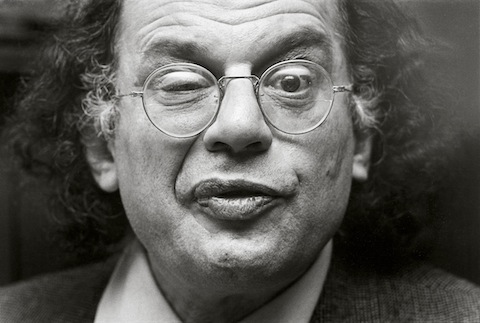Image by Michiel Hendryckx.
Although the boundaries of what should pass for free speech in high school English classrooms will be forever in debate, most everyone would agree some boundaries must exist. But what of the speech of famous authors? Of towering figures of 20th century poetry? Should their speech be subject to review? What of an English teacher who allows the most risqué Beat poem you’ve ever heard to be read aloud in class by the poet himself, Allen Ginsberg, via an online video (perhaps this one)? Award-winning English teacher David Olio, a beloved 19-year veteran, did just that when a student asked to share Ginsberg’s ecstatic, and very explicit, poem “Please Master” with the class.
After complaints from several students, the school administration suspended Olio, then forced him to resign. Whether or not this decision was just is a debate that extends beyond the scope of this post. The variables are many, as Slate’s sympathetic Mark Joseph Stern admits, including the fact that Olio did not exactly prepare his students for what was to come, nor give them the opportunity to opt out. The high school seniors—on the threshold of adulthood and some already with one foot in college—may not have had their “emotional health” endangered, as Olio’s termination letter alleged, but it’s little wonder some of them found the material shocking.
Ginsberg’s poem, which you can hear him read above, describes a “fantasized sexual encounter between Ginsberg and Neal Cassady, the inspiration for the Dean Moriarty character in Jack Kerouac’s On the Road.” It is graphic, writes Stern, but “not obscene.” Instead—in its allusions to St. Teresa’s angelic visitation in a “profane description of anal sex as a nearly divine act”—Ginsberg’s poem is “dangerous because it juxtaposes tenderness with masochism; dangerous because it rapturously celebrates a vision of same-sex intimacy we are only supposed to whisper about.” Read the poem, listen to Ginsberg read it, and judge for yourself.
Of course, this is hardly the first time Ginsberg’s work has caused controversy. His Beat epic “Howl” (1955), with its sexually charged lines, irked the U.S. government, who seized copies of the poem and put its publisher, poet and City Lights’ bookseller Lawrence Ferlinghetti, on trial for obscenity. Well over sixty years later, Ferlinghetti has written in defense of David Olio. We can safely assume that Ginsberg, who died in 1997, also would approve. And while we have every right to be shocked by Ginsberg’s poem, or not, and find the decision to fire Olio warranted, or not, I tend to agree with Stern when he writes “if every English teacher were that enthusiastic about his subject, America would be a much more literate, educated and interesting place.”
Related Content:
The First Recording of Allen Ginsberg Reading “Howl” (1956)
Allen Ginsberg Reads a Poem He Wrote on LSD to William F. Buckley
Allen Ginsberg Talks About Coming Out to His Family & Fellow Poets on 1978 Radio Show (NSFW)
Josh Jones is a writer and musician based in Durham, NC. Follow him at @jdmagness.


